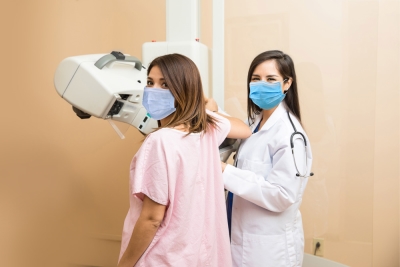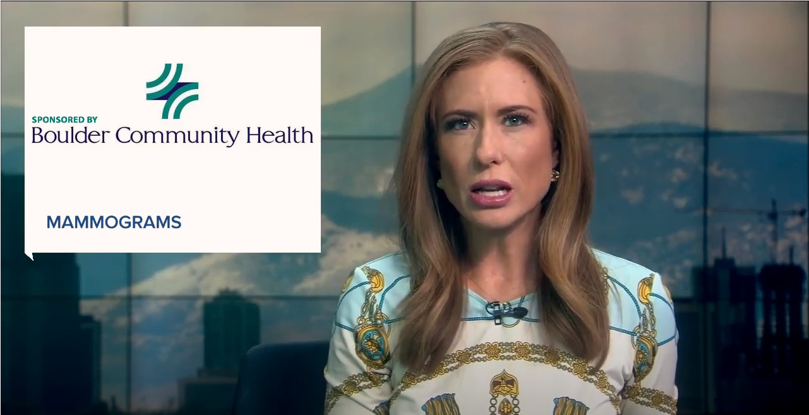Mammography Services
Screening and Diagnostic Mammograms
 Staying on top of your annual screening mammogram matters. When breast
cancer is caught early, the five-year survival rate is greater than 95 percent.
Staying on top of your annual screening mammogram matters. When breast
cancer is caught early, the five-year survival rate is greater than 95 percent.
Knowing that early detection can be our patients’ best bet at fighting breast cancer, Boulder Community Health (BCH) invests in the most advanced technology in mammography and breast imaging. With the latest imaging tools, we can detect abnormalities long before you or your doctor could notice them.
All of BCH’s mammography locations have been recognized as a
Comprehensive Breast Imaging Center, a designation of the American College of Radiology.
- The Latest Mammogram Technology
- Diagnostic Mammograms
- When are Breast Screenings Recommended?
- What to Expect During Breast Imaging
- Mammography Screening Benefits and Risks
- Schedule a Mammography Appointment
The Latest Mammogram Technology
All of BCH’s locations offer the latest advances for mammogram screenings:
Digital mammography: Creates incredibly accurate and vivid images of breast tissue. Compared to traditional film-based mammography, digital mammography uses less radiation and allows our radiologists to manipulate high-resolution digital images so abnormalities can more easily be seen.
3D mammography (tomosynthesis): This is a newer type of imaging technology that creates a highly detailed, 3D composite picture of the breast, allowing radiologists to view several layers of breast tissue from various angles. This type of mammogram makes it easier to detect small cancer tumors in moderately dense or very dense breast tissue. It’s also beneficial for patients with an increased risk for or personal history of breast cancer.
Diagnostic Mammograms
A diagnostic mammogram is done to inspect an abnormality that has been found in the breast, either during a screening mammogram, a breast self- exam or a clinical breast exam by your doctor. During a diagnostic mammogram, more images are taken in order to determine the size and location of the abnormality and to better examine surrounding tissue.
Diagnostic mammography may not be fully covered by insurance. Contact your provider for specifics. At your appointment, we will give you an estimate for your portion of the charge. You can pay all or part of the amount at that time.
IMPORTANT: Before your diagnostic mammogram, please request your medical record if prior breast imaging was not done at a BCH facility. If we have not received these records before your diagnostic study, the appointment may need to be rescheduled.
When are Breast Screenings Recommended?
Most women should have annual screening mammograms beginning at age 40, according to current American College of Radiology (ACR) and the Society of Breast Imaging (SBI) guidelines. Doctors may recommend starting mammograms before age 40 if you have a strong family history of breast cancer.
BCH recommends that women have regular screening mammograms annually starting at age 40, along with monthly self-examinations and annual physical checkups that include a clinical breast exam. Three-quarters of women diagnosed with breast cancer do not have a family history and are not considered high risk.
- Age 40 to 74: Start screening with mammogram annually.
- Age 75 and Over: Speak with your doctor about whether you should continue with mammograms.
What’s New? American College of Radiology and the Society of Breast Imaging now recommend that ALL women should be evaluated for breast cancer risk no later than age 30. Have your physician review your personal and family history and complete a risk assessment.
If you are considered high risk for breast cancer
Women who are high risk for breast cancer should get a breast MRI and a mammogram annually, typically starting 10 years prior to earliest breast cancer diagnosis in the family. Factors that make you high risk for breast cancer include:
- A lifetime risk of breast cancer of about 20% or greater, according to risk assessment tools that are based mainly on family history
- A known BRCA1 or BRCA2 gene mutation or other genetic predisposition for breast cancer
- A first-degree relative (parent, brother, sister, or child) with BRCA1 or BRCA2 gene mutation, but only if you have not already had any genetic testing
- Previous radiation therapy to the chest when you were between the age of 10 and 30 years
Work with your health care provider to calculate your lifetime breast cancer risk using a risk assessment tool such as the Gail Model or Tyrer-Cuzick Model.
What to Expect During Breast Imaging
On the day of your appointment, please don’t wear deodorant, powder, lotion or ointment around the chest area or under your arms. You may want to wear a two-piece outfit, since you only need to remove your top when you change into a gown for the screening. Please arrive 15 prior minutes to your scheduled exam.
Each breast will be compressed for several seconds to flatten the tissue to allow for a clearer image. Some women find mild discomfort during compression but it subsides quickly. You may want to schedule your screening during a time of the month when your breasts are less tender and avoid caffeine since caffeine can cause an increase in breast tenderness.
Screening exams generally take about 20 minutes. A radiologist will review the results and send your doctor a report within 24-48 hours -- please contact your doctor directly for results.
Mammography Screening Benefits and Risks
The benefits of detecting possible breast tumors at early stages far outweigh the minimal risk from low-dose radiation of screening or diagnostic breast imaging. Additionally, BCH’s dedicated medical physicist regulates all radiation doses to ensure patients receive the least amount required during all imaging procedures.
Schedule a Mammography Appointment
For your convenience, BCH offers both screening and diagnostic breast imaging at three locations:
- Imaging at Community Medical Center (Lafayette)
- Imaging at Erie Medical Center (Erie)
- Imaging at Foothills Hospital (Boulder)
To schedule an appointment, log on to MyBCH or call 303-415-5170.
BCH accepts most major insurance plans. Explore Self-Pay pricing options if you are uninsured or wish to pay directly for any service.
Questions About Your Bill?
For Billing and Payment information, click here.
-
Imaging at Foothills Hospital
4747 Arapahoe Avenue
Boulder, CO 80303
(303) 415-5170 More Information -
Imaging at Community Medical Center
1000 W. South Boulder Road
Lafayette, CO 80026
(303) 415-4300 More Information -
Imaging at Erie Medical Center
101 Erie Parkway , Suite 102
Erie, CO 80516
(303) 415-5170 More Information

